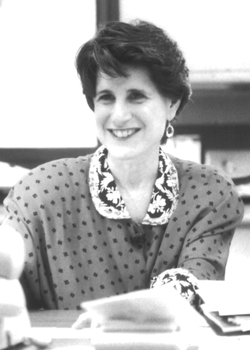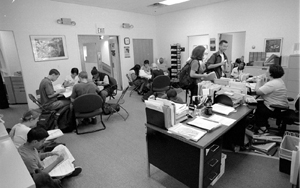The University Record, October 18, 1999 By Lee Katterman
Office of the Vice President for Research

The Undergraduate Research Opportunity Program (UROP) has been recognized with a Presidential Award for Excellence in Science, Mathematics and Engineering Mentoring.
Through these annual awards, administered and funded by the National Science Foundation (NSF), President Clinton honors individuals and programs that have been exemplary in encouraging minorities, women and persons with disabilities to pursue careers in scientific, engineering and technical fields.
In the letter from the White House announcing the award to Fawwaz T. Ulaby, vice president for research, Presidential Science Advisor Neal Lane wrote: “As we approach the 21st century, it is essential that all American students are prepared to meet the scientific and technological challenges of the future. Your institution’s accomplishments in mentoring students from underrepresented groups exemplify the talent and commitment this program aims to recognize.”
No personal influence is as powerful, long-lasting and positive as that of a superlative mentor, noted NSF Director Rita Caldwell. “Those receiving this award are a true national resource and help define the quality of our nation’s future human resources in science, mathematics, technology and engineering,” she said.
UROP, one of a number of initiatives to improve the undergraduate experience, was established in 1988 by LS&A to improve undergraduate education and minority student retention and academic achievement. Research partnerships between first- and second-year students and faculty researchers are the program’s centerpiece. From 14 partnerships the first year, the program has grown to involve 900 students working with more than 550 faculty in a wide range of projects, according to the program’s director, Sandra Gregerman. The program’s success with minority students, Gregerman noted, led the U-M to offer UROP to any incoming student, although the program maintains its original emphasis on students of color and women in science.
“We are deeply grateful to have our program honored by the President,” Gregerman said. “We are proud of what our faculty-student partnerships have accomplished. Several other universities, including the University of Wisconsin and the University of Kentucky, have consulted with UROP and are developing programs modeled on ours.”
Unlike many retention efforts, Ulaby noted, UROP focuses on academic excellence and achievement, not remediation. “UROP has been successful in its mission to weave minority students into the fabric of the campus community at an early point in their academic careers.”

U-M faculty have played a crucial role in UROP, Gregerman added. “UROP would not be so successful without the participation and outstanding mentorship of our faculty who have opened up their laboratories and research to close to 4,000 students since the program’s inception. These students have co-authored papers, presented research at national meetings and shared in exciting discoveries.”
“We have changed the undergraduate culture at the U-M with the help of UROP,” Gregerman said. “Students now expect and seek out opportunities to do research throughout their undergraduate careers.”
Julian Heilig, a May 1997 LS&A graduate and recent recipient of a master’s in public policy from the U-M, recalled the crucial role UROP played in his academic success.
“I came from a high school where there were 13 people in my English class, 13 people in my calculus class, 80 people in my graduating class.” He said the U-M was “really intimidating to me, [but] UROP helped me connect with the University. To be honest, without UROP, without the relationship I formed with my research mentor, I would have become a drop-out statistic.”
UROP also supports students through a network of peer advisers, upper-level undergraduates who once were UROP participants. “One of the most rewarding and difficult aspects of being a peer adviser has been encouraging young women to stay in engineering and the sciences,” said Amanda Esquivel, a College of Engineering student. “I think many of them become disheartened early on in their college career, and I enjoy helping them get through that stage.”
New this year as part of UROP is an expanded junior/senior program to accommodate the growing number of students who want a research experience prior to graduation. Also, UROP is increasing opportunities for students in the community with research placements at Parke-Davis, the Great Lakes Environmental Research Laboratory and community-based organizations in Washtenaw County and Detroit.
“I am pleased that Michigan and UROP have been honored for our efforts to mentor students,” Ulaby said. “And I’m not entirely surprised, either. UROP has a terrific record of involving undergraduate students in their learning through research experiences, backed up by assessment research that is beginning to help us understand why these mentoring experiences are so useful for the success of our undergraduate students.”
A recent UROP alumni survey, for example, shows that for students of color, an undergraduate research experience is critical to their going on to graduate and professional school.
Ulaby also noted that the UROP is one of many programs that integrate research and scholarship with undergraduate education to enhance student learning. Other programs include Women in Science and Engineering, Marian Sarah Parker Fellows, and Summer Research Opportunity Program.
UROP will receive a $10,000 grant and a Presidential commemorative certificate. The grant will be directed back into UROP to directly benefit student participants.

